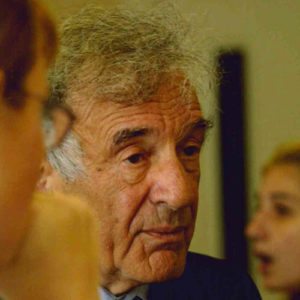The Hope He Gave
If ever there was a modern warrior for peace, for light and for love, it was Dr. Elie Wiesel. With his gentle voice, he not only educated the world, he compelled his students and friends alike to “think higher and feel deeper.”
I was blessed to share classes and conversations with Dr. Wiesel. Often I find myself wondering about the very same question he posed to us in Room 210 of Eckerd College’s Franklin Templeton building: “Imagine how many moments of history had to align to bring us together today; just imagine. …” I couldn’t fathom to count, but I am eternally grateful for the winds of fate that provided us the moments we were lucky enough to have.
Dr. Wiesel spoke with my fellow classmates and me of friendship, love and memory. We enjoyed delightful conversations, moments of heartbreaking empathy, and plenty of coffee and Oreos. Dr. Wiesel loved to draw us to the edge of our seats with his memories and musings, then, just as we seemed stumped by a particularly thought-provoking question, he would softly provide us a reprieve with a wonderfully nonchalant and simple statement, “And now, it’s time for coffee.”
I, like all of us privileged enough to share time with him, owe Dr. Wiesel many thanks. We must thank him for pushing us into uncharted intellectual territories and forcing us to confront emotions and ideologies that have helped us become more empathetic individuals. We must thank him for igniting a fervor for knowledge in every classroom he ever entered and for helping us develop a more complete understanding of what it means to be a human on this Earth. We must thank him for showing us the subtleties of friendship and love, the complexities of memory and perception, and the liberties we can find in forgiveness.
Personally, I must thank Dr. Wiesel for inspiring me to pursue a relationship with the love of my life. In a conversation I shared with Dr. Wiesel, I explained to him a few matters weighing on my heart, particularly how I was worried about approaching a woman I was nervous to begin a relationship with. He looked me squarely in the eyes and said, “Don’t worry, if it was meant to be, it will. …” And it was. Thank you, Dr. Wiesel. Thank you so much. You will be missed, but I know you will be watching over us all. Ever caring, ever our friend, ever our guide and ever a light of hope for humanity.
—Ross Busch ’15


